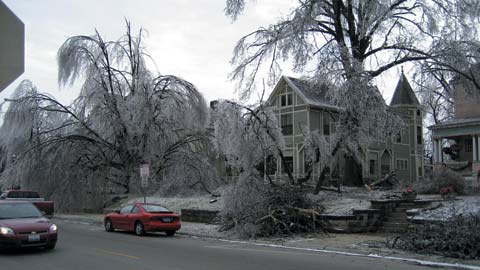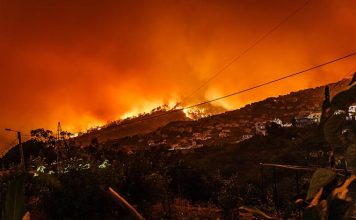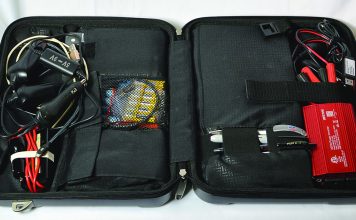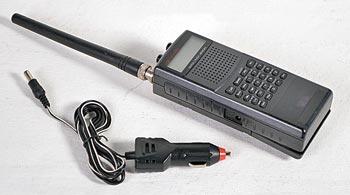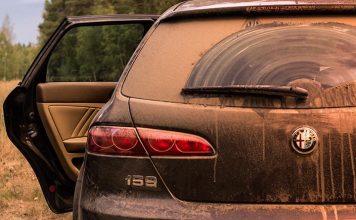 |
|
| Issue #108 • November/December, 2007 |
The weather reports indicated ice could be coming in. It was already raining and getting chilly on that early Friday afternoon in Springfield, Missouri. Hubby and I drove to the nearby Wal-Mart to pick up a few extra items and some dry ice for our freezers, in case the power went out. I planned to check on a few items that generally disappear when the weather turns bad: bottled water, batteries, and dry ice. Much to my surprise, there wasn’t a lack of any of them. Either people felt they were prepared for bad weather, or weren’t taking the weather report seriously.
The storm hit in three waves over two days. Ice started building up on trees, power lines, cars, and foundation plants around 5 pm as dusk settled in. We scattered a few handfuls of ice melter on the front steps, and noticed that we only had half a bag left.
After dinner we settled in to watch a movie. Outside, the darkness was occasionally illuminated for an instant by a bright flash, but no thunder followed though. The house lights would flicker and the TV turned off repeatedly. We later realized these were the first signs of transformers blowing throughout Springfield.
Around 9 pm, the power went off. Lights out, TV off, heater off. We lit candles and used flashlights to go through the house to unplug appliances and electronics to protect them. When power is restored, it often comes with a surge. (This ended up saving us a great deal of money and aggravation when power was finally restored, as we’ll see.)
|
I turned on our gas cookstove oven, and opened the door. We purchased the stove for one primary reason: the oven will operate without electricity. As long as it has natural gas and the pilot lights, it heats and cooks. Now, we know that there are published concerns about heating with a gas cookstove, including the possibility of carbon monoxide poisoning. Our house is old and leaky, so there is always a bracing draft of fresh air moving around the lovely original windows, and we’ve got carbon monoxide (CO) detectors, too.
The power came back on at 11 pm, but we were already headed to bed, so we left everything unplugged. We turned off the cookstove, though, as the forced air heater kicked back in. Around 1:30 am the power was off again, and my husband turned the cookstove oven back on and closed off the bedroom.
The next day was one of those leisurely snow days. We didn’t have to go anywhere, so with the computer off, along with the rest of the power, we puttered around. It was a quiet, productive day. I started a new knitting project and baked cookies. We kept the radio on, and aside from the hourly weather reports of, “Yes, it’s really icy out there,” it was the usual national talk shows.
Around sunset, we decided we’d like to listen to shortwavewhere was that radio? Husband took a flashlight to the basement, then to the attic to look for the radio, but in the end we couldn’t remember if we had given it away when we left the farm.
Lesson: Preparedness supplies should be in a central, easy-to-reach location.
Instead, we listened, on and off, to the local station, finally turning it off. The temperature in the house settled down to 58 degreesnot too bad. We bundled up in extra wool sweaters and heavy socks, and invited dogs to sit next to us on the couches.
I tried to read and knit, but even with several candles nearby, it was too dark.
Lesson: Insufficient, inefficient light is annoying and contributes to a poor use of time.
Now, it was my turn to hunt through boxes, this time for our oil-burning Aladdin lamps. Once again, we couldn’t remember if we still had themmaybe they were still at the farm, too. I knew we had a PetroMax lantern somewhere, but couldn’t find the pump for it. When I checked in the closet, I only found the solar panel and deep cycle battery we’ve been meaning to set up.
|
Lesson: Do it now! All the preparedness gear in the world won’t do you any good if it’s not functional.
That night, we left the kitchen cookstove oven on, closed the door to our bedroom, and opened the bedroom windows to outdoors. It was cold out, hovering in the high 20s, but under flannel sheets and down comforters, and with little dogs in bed, we were toasty and calm. Through the night we continued to awaken to the slick hiss of ice arriving, and the gunshot-loud cracks of trees shattering, followed by the broken-glass sound of ice and limbs falling. In the morning the bedroom was freezing, but I closed the windows and opened the door to the rest of the house, and heat poured back in.
Sunday morning, we realized that our inefficient heat was passing up into the attic and out. We hung a blanket across the doorway to the attic steps, blocking the heat so it would stay down on the first two floors. A door would have been even better to avoid that heat loss. We realized that this “leak” had probably been costing us plenty on our utility bills all winter.
Lesson: Check your home for heat efficiency. Insulation, weather stripping, and doors between levels and rooms will help contain heat where you need it.
The power was still off, but water was flowing and the gas water heater was still doing its job. We took hot showers, lit by candles.
About the same time, I began to worry about the second floor kitchenettethe plumbing is set into the east wall in a room that was hovering around 45 degrees.
I ran through options we might have used on the farm: heat lamp (no power), oil lamp (can’t find it), candles (too dangerous), and so on. Finally, we realized we’d have to allow heat back into this very leaky uninsulated room and take freeze precautions. We turned on the spigots to a little trickle, and put a two-gallon pan of hot water under the sink to circulate some warmth around the pipes. I replaced the hot pan every eight hours or so after that. Consequently, we wasted heat in an entire room, just to keep pipes from freezing, because we didn’t have a more efficient method.
Lesson: Know where all the plumbing in your house is, and have a plan to keep the pipes from freezing and bursting.
We missed churchthe car was literally frozen in place under a ¾-inch thick sheet of ice. Outdoors, it was a glistening mass of slippery ice everywhere. There were few cars on the roadway, even though the road-salt trucks had just been by. Icicles hung from power lines, trees, bushes. Some plants looked as though they had become ice sculptures, great hard solid lumps, with an evergreen encased in a glass-like shell. We continued to hear the intermittent CRACK and crashing, trees coming apart all over the city. Sometimes, there would be a crack, crash, and metallic cruncha tree hitting a parked car. We spread the last of the granulated salt-like “ice melter” by hand over the front steps. The ice melter sack, a 20-pound heavy plastic bag, flopped over empty.
Lesson: You’ll need more of those basic, but critical, supplies than you realize. Have extra.
We started to wonder if hubby’s students in traditional fencing and swordplay would be able to come for lessons this afternoon. We decided most would probably cancel. Then, we realized that not a one of them had called to cancel. I checkedthe phone was dead.
Lesson: Cordless phones won’t work when the power is out. Make sure you have a corded phone for emergencies (and know where it is). Plug-in cell phone chargers won’t work when the power is out either, so keep an adapter in your vehicle.
So, now we don’t know if any students are coming or not, or if someone is calling for help. They’ll just be getting an unanswered ring. Students don’t have our cell phone number, either.
Also, if you have one of the phone services dependent on a high speed internet connection, such as VOIP (voice over internet protocol), your 911 service is not available, whether or not your electricity is on. You should have emergency numbers on hand because you need to dial them directly.
Lesson: Institute back-up communications for critical contacts and emergency services.
Husband, frustrated, decides to do something productive and starts chipping the car out from under the sheet of ice. It is at this point that my brain kicks into gearand I notice that there are power lines lying everywhere.
Lesson: Survey the scene before walking into itdowned power lines could still be “live.”
They are dangling from the house across the street, laying in the roadway, hanging from one side of the street to the other about three feet above the road, draped over parked cars, on sidewalks. I guess that’s why the power is out. And will be out. This isn’t getting fixed in a day.
Lesson: Plan for the weather and for the damage to be worse than predictedand for the repairs to take longer than expected.
Now, very carefully, we look over our propertyall power lines are up, but heavily weighted with long, sharp iciclesas are the tree branches, fences, and backyard dog pens. A slight breeze makes the large ancient maples in the backyard creak ominously. We do a cautious inspection for anything that might be crushed if a tree fallsthe garage might get hit, but there’s nothing we can do about that now.
Lesson: Survey your property for possible hazards before a crisis hits, and remove them now.
The dog pens could be crushed, too, so we turn the three dogs out of their pens, and the pack rushes up onto the covered back porch. The temperature hovers around freezing, so the dogs are comfortable and frolicking in their thick winter coats.
Everything takes longer than we thought it wouldwalking is hazardous, with many near-falls and lots of skittering around, thanks to a lack of ice melter. The trash can is frozen shut, with a thick glassy armor of ice. Inside the house again, we listen to radio reportsroadways are mostly clear, avoid downed power lines (duh!), another round of ice on the way. At this point, we make a decision to do something that, in retrospect, wasn’t terribly wisewe decide to drive to the Wal-Mart and see how people are respondingany more concern than we saw on the last trip?
|
The drive is uneventfulwe are one of only a few cars creeping down the road, and the salt trucks move up and down the street. Power lines and tree limbs in the road make driving slow. People are surprisingly polite, waiting at corners where stoplights are down and waving each other through. It is a deep gray day, heavily overcast, and the ice keeps coming down and building up. I see a handwritten sign in one yard, placed on the curb: “Line Down.” Putting up the sign is a good ideait alerts passersby and the utility company to the problem.
Cars have their lights on even in the middle of the afternoon. By contrast, every stoplight is dark, every store for the three mile drive is dark and empty, every house is dark. This is when the reality of the situation hit me. Thousands upon thousands of people, hundreds to thousands of businesses, all at a standstillmany in cold houses.
Wal-Mart reinforces this sinking feelingthere are few people there. The lights flicker ominously. I spend some time looking at shopping cartsone woman has four gallons of drinking water, that’s all, but she’s very happyshe got the last jugs of water in the store. Another had three loaves of white bread, a box of hot fried chicken, a bucket of potato salad, three large bags of chips, a small bag of tangerines, a liter of sugar-free lemonade, and a box of donutsshe looked worried, uncertain what to do next. Her husband is pale and wide-eyed. I watch a man stride confidently up to the candles rack, and stare, open-mouthed, at the utterly empty shelves. A tired looking woman picks up and turns over a package of luncheon meat, then puts it back in the caseit had been opened. The rest of the bologna, lunch meats, and cheeses are gone.
By this point we were about 48 hours into the ice, and the only operating Wal-Mart in a town of 200,000 was completely out of candles, bottled water, toilet paper, bread, soup, luncheon meats, C- and D-cell batteries, dry ice, bagged ice, flashlights, ice melter, cat sand (which is often used along with ice melter for traction on ice), woolen socks, camp lights, camp stoves, Coleman fuel, and propane jugs, and didn’t expect any deliveries. Even the chips, beer, and ammunition aisles were sparse.
Also absent from the shelves were car cell phone chargers (let those who have ears to hear, hear), since there would be no charging from dead house lines, and cheap corded telephonesapparently everyone else discovered that their cordless house phones didn’t work when the power went off, too.
There were still AA batteries available, but a store clerk told us that there had been a loud argument between several customers the previous night over the last of the C- and D-cells.
Worse yet, somebody said that the only gas station still open, the one on the same “circuit” as Wal-Mart and the major hospital, couldn’t accept credit cardsthey were cash only. Their phone line was out, too. More talk about angry customers, near fist fights. When we leave, I notice a two-block-long line to the only still-open cash-only gas station. We pass five other stations on the way home, all closed and dark, one with a “No Gas” sign propped against the pumps.
Lesson: You can’t stock up too soonduring an emergency, the food, fuel, and other critical items you need will already be sold out, or will be extremely difficult to get.
That evening, snug in our warm house, well fed, we watched a DVD on a portable player. Outside, the ice kept coming down. The town ground to a standstill. The town’s smaller talk radio station dumped their usual national talk shows. Running on generator power, the local host, Vincent David Jericho, did hours and hours of person-to-person calls”Do you need help? Can you provide some help? Who knows where people can still buy kerosene?” There were still people who hadn’t been able to get out of their homes because of downed trees or lines across their doors. “Who can go and help chainsaw a way out?” When his voice wore out, he put on old radio playsJack Benny, Red Skelton, mysteries, who-dun-its.
We left the station on through the night. At times we woke up as Jericho accepted calls from people who didn’t know what to do, were out of food, water, heat, or didn’t know where to shelter. He listened, exhaustion in his voice, sometimes on the verge of tears, then found a resource, a link, a lifeline. City utilities worked around the clock to get the power back up, but I believe that Vincent David Jericho saved this cityhis voice calmed the hysteria and fear that was building as the days wore on.
Lesson: One good man can make a big difference.
Three and a half days later, our power came on again. We waited several hours before plugging everything back in, just in case of power spikes. Unfortunately, most people didn’t wait or hadn’t unpluggedand the following week dead TVs, refrigerators, microwaves, washing machines, and assorted other electrical appliances appeared on curbsides, waiting for the trash truck.
Lesson: When the power goes out, unplug everything. Wait until restored power is stable to plug appliances back in, or electrical surges could fry your equipment.
A side note: shippers brought in generators within a few days of the storm, and sold them in parking lots. Sold everything they had. The prices were 30% to 50% higher than the same generator prior to the storm. Many people used them indiscriminatelyone person we know burned theirs up in the first 24 hours of use (“Oil? You have to put oil in it?”). Another family had their generator before the storm, but during the storm, their neighbors complained about the noise and sent police to ask them to turn it off. They turned it off, their heat went off, and pipes froze in their walls and destroyed the wall and an adjoining room.
Lesson: If you have a generator, muffle the sound so neighbors can’t hear it. Know how to operate it properly, and have enough fuel and oil to last you through an emergency.
The city lingered for another three weeks with some areas out of power and some having power intermittently. We ended up losing most of one old maple, and a good portion of the top of the other maplewe will have firewood for a month out of the cut limbs. They fell into the yard, but luckily missed the garage and dog pens. Some wooden fence line needs to be replaced where the neighbor’s branches crushed it.
|
We took a very large financial hit. My husband’s fencing students had their own problems from the ice, and couldn’t take lessons for a whileseveral had frozen pipes that ruptured in their homes with subsequent damage; some had to laboriously hand-haul water out to distant fields for livestock; many left town to stay with unaffected relatives; some were simply frozen in. My clinic, where I work as a Family Nurse Practitioner, was without full power for nearly three weeks. Consequently, patients couldn’t be seen, and expensive refrigerated medicines went bad and had to be destroyed. It took over four months for the city to clean up the massive amount of fallen debris.
But, we could have done better. It took the ice to teach me things that I already “knew” but just hadn’t put into practice. We’ve managed to locate the missing Aladdin lamps, the PetroMax, and the shortwave radio, and made sure we could all operate them in the dark. We’re in the process of installing that solar panel that has lingered at the back of the closet for half a decade. We’ve positioned all our emergency supplies in one central location, added more batteries, small propane canisters, and extra lamp mantles and chimneys.
We’ve started to realize how very fortunate we were during the storm. We had natural gas for the stove and water heater. Friends who relied on electric stoves and water heaters had noneone family drove out of town after a week of no power to a truck stop to use the trucker’s showers. We didn’t have to drive around burning precious gasoline looking for someplace that wasn’t sold out of fuel for a kerosene heater. We had the dry ice in our freezers, so we didn’t have to move food into the “natural deep freeze” outdoors, or lose an expensive freezer full of meats like others we knew did. We had plenty of food on hand and could cook whatever we were in the mood for (which seemed to be mostly soup!). We had non-electric entertainment and games, useable even in dim candle light. We were warm enough that we didn’t have to try to find a spot in the jammed shelters throughout the city. Many businesses were closed in town so there wasn’t any place we had to be during the workday. We had some emergency funds in a safe place, so we didn’t agonize when the ATMs were down and banks were closedand were even able to help a friend who couldn’t access his account and desperately needed gas and food. All in all, we came through it without real suffering.
It could have been worse, too. Much worse. The flickering power in the Wal-Mart indicated problems with the lines that fed the main hospital, as well. If Wal-Mart went down, so would the last open gas station, and all emergency and hospital services, as well. If Vincent David Jericho
hadn’t been willing to talk through the night, day after day after day, there could have been widespread panic. People simply didn’t know what to do, and couldn’t communicate with authorities to find out. Jericho encouraged people to work together, to look out for their neighbor’s safety. Finally, if the utility repair crews hadn’t pulled out all the stops and worked around the clock, the long-term loss of power would have been catastrophic.
We were fortunate, but we still learned plenty of lessons. Hopefully, with improved planning and better preparedness skills, we can all handle whatever lies ahead.


